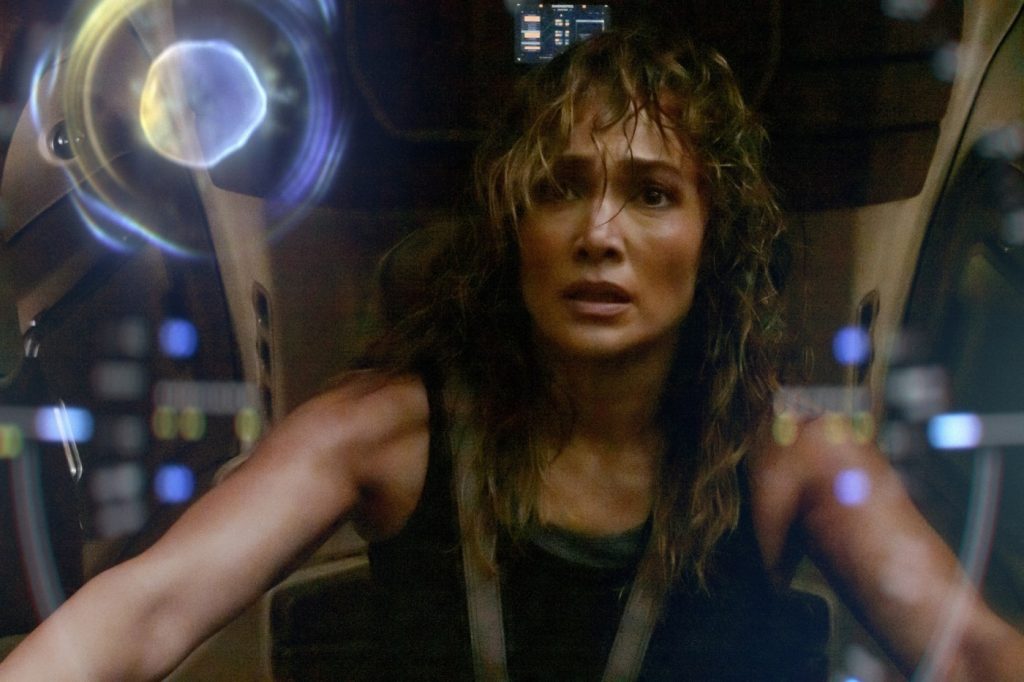The screenplay for “Atlas,” a new Netflix science-fiction movie starring Jennifer Lopez as a woman desperate to save humanity from a dangerous artificial intelligence, is the work of Leo Sardarian and Aron Eli Coleite, whose respective IMDb credits include the TV series “StartUp” and “The Spiderwick Chronicles.”
If we didn’t know better, we’d guess “Atlas” was composed by an AI.
It feels as though the movie’s producers instructed one of today’s intriguing (but also at least vaguely frightening) programs built on large language models — maybe OpenAI’s ChatGBT, maybe Google’s Gemini — to spit out a script about a future in which humanity is at war with robots that once served them. That would help explain why “Atlas” feels like it consists of bits and pieces from so many other movies and why it is plagued by such subpar dialogue.
Regardless, it’s a bit of a slog.
Directed by Brad Peyton, “Atlas” is set in the future, when humanity’s needs-attending robots have rebelled.
“For years,” says a TV newswoman, “we have been told they would never harm us, but tonight, all of that has changed.”
We get images and sounds of chaos around the world. Many people perish. You know the deal.
This robot revolution has been led by Simu Liu’s Harlan, who flees to Planet GR39 in the Andromeda Galaxy after his war with the International Coalition of Nations tilts humanity’s way.
The main narrative begins 28 years later — about 150 years from now, according to the movie’s press notes — with Lopez’s heavy-handedly named Atlas Shepherd a military analyst and an expert on all things Harland, thanks in part to a shared past with the once-gentle robot that will be revealed in time.
She wants in on a mission to that unstable planet, but the operation’s commander, Sterling K. Brown’s Col. Elias Banks, prefers to have nothing to do with her, noting to a superior officer, Mark Strong’s Gen. Jack Boothe, that she failed the exam to become a ranger four times and that her psych evaluation says she’s “rigid and hostile.”
“I prefer ‘driven and determined,’” Boothe responds.
A scene from Netflix’s “Atlas,” directed by Brad Peyton. (Netflix/TNS)
Atlas does, of course, force her way into the mission, Banks deciding he does need her — only after Boothe says HE needs her on Earth. (Yeah, it’s THAT kind of script.)
Once on Planet GR39, Banks’ Rangers will wear giant mechanical Arc 9 suits, each of which is outfitted with a sophisticated AI that melds with its operator via a neural device worn near the ear.
En route, Atlas is scoffed at for showing up for a meeting with thick paper packets of information but is insistent there will be no more digital briefings. (Her distrust of all things computerized would make more sense if we hadn’t met her waking up to information provided by an AI against whom she fell asleep playing chess the night before.)
The spacecraft’s arrival on the planet doesn’t go as planned, with the rangers — and Atlas — being forced to abandon ship via the Arc 9s, leading to an action sequence that might seem more impressive were it not so strikingly similar to a better-executed version of one from the far superior 2014 science-fiction film “Edge of Tomorrow.”
Soon, Atlas is separated from the others, left to try to survive both Harlan’s hostile forces and the planet’s largely inhospitable environment with her Arc 9’s AI, Smith (voiced by James Cohan). These two intelligences argue about the best courses of action, with Smith pleading with the defiant Atlas to don the neural device and sync with him/it; she stubbornly sticks to learning to operate the Arc 9 the old-fashioned way and on the fly.
Surprisingly, the ongoing conversation between Atlas and Smith is what amounts to “Atlas” at its best, thanks largely to the pitch-perfect voice performance by Cohan.
However, this increasingly philosophical discourse, too, runs off the rails as Atlas and Smith discuss the nature of existence, the close-minded former asking the thoughtful latter if he thinks he has a soul.
“I think everything has a soul,” he says.
“But you can’t find it in your code,” she counters.
“Not any more than you can find it in yours, but I have faith it’s there.”
Lopez (“Hustlers,” “The Mother”) feels miscast in the role, but we’ll say this: She puts her back into selling the movie’s hacky lines and its key moments. You can’t help but appreciate the go-big-or-go-home approach given what the actress and pop star has to work with here.
Despite the talents of Brown (“This Is Us,” “American Fiction”) and Liu (“Shang-Chi and the Legend of the Ten Rings,” “Barbie”), Banks and Harlan are largely background players, although rest assured Atlas and the robotic ghost from her past have their requisite climactic confrontation.
Along the way, “Atlas” offers forgettable bits of action with visual effects that more often feel cheap. (For those who care, however, the Dolby Atmos Sound mix is fairly decent.)
Based on guilty-pleasure fare including 2015’s “San Andreas” and 2018’s “Rampage,” we expect a bit more from Peyton. “Atlas” simply isn’t entertaining enough to reach even guilty-pleasure status.
It’s not quite right to compare “Atlas” to an AI’s “hallucination,” as that is the term that’s been adopted for when a program provides incorrect factual information. Nonetheless, more often than not, it plays like some kind of bad dream.
‘Atlas’
Where: Netflix.
When: May 24.
Rated: PG-13 for strong sci-fi violence, action, bloody images and strong language.
Runtime: Two hours.
Stars (of four): 1.5.


